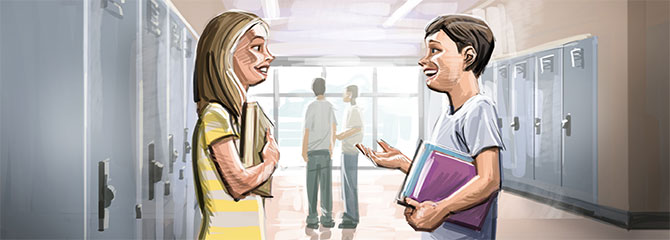Disclosure

Telling Your Friends, School Staff, and Classmates
You’ve probably been faced with this before. Who should you tell about your bleeding disorder? How much should you tell? That depends on you. If you’re moving to a new school with some of your classmates, you may have already shared the information. But, you may make more friends and not be sure of what or how to tell them, if at all.
You and your parents need to let the school staff know about your bleeding disorder because they have to be prepared to help you if you get hurt or have a bleed. Your PE teachers (and your coaches if you play a sport) also need to know. They may have to make some special adjustments so you can join in the activities.
One thing is certain: you know more about your bleeding disorder than your friends ever will. In the beginning, you can keep it simple. You don’t have to tell them everything, like how often you infuse or how many trips to the hospital you’ve had. If your friends want to know more, tell them it’s okay to ask questions. You decide how much you want to share.
Remember, your parents, teachers, school nurse, and social worker at your Hemophilia Treatment Center (HTC), or even your guidance counselor, may be able to help you decide if and when you’re ready to talk about your bleeding disorder to others.
Here are some examples of what you can say about your bleeding disorder to your friends or classmates:
- I have _________, which means my blood doesn’t act like most people’s blood. When I cut myself or fall down, it takes me longer to stop bleeding. I take medicine to help it stop.
- Some kids with diabetes have to get shots. It’s like that for me. I need shots to stop my body from bleeding too much.
- It’s not contagious. You can’t catch it from me.
- I may not be able to do everything that other kids do, but I can do a lot.
